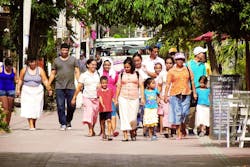NIH funds community engagement research efforts in areas hardest hit by COVID-19
The National Institutes of Health (NIH) announced a $12 million award for outreach and engagement efforts in ethnic and racial minority communities disproportionately affected by the COVID-19 pandemic, according to a press release from the NIH. The award to RTI International, a non-profit research institution, will support teams in 11 states established as part of the NIH Community Engagement Alliance (CEAL) Against COVID-19 Disparities. These teams have received initial funding to immediately create CEAL programs, and RTI will serve as the Technical and Administrative Support and Coordination (TASC) center.
The CEAL research teams will focus on COVID-19 awareness and education research, especially among African Americans, Hispanics/Latinos, and American Indians — populations that account for over half of all reported cases in the United States. They also will promote and facilitate the inclusion and participation of these groups in vaccine and therapeutic clinical trials to prevent and treat the disease. The communities of special focus include counties in Alabama, Arizona, California, Florida, Georgia, Louisiana, Michigan, Mississippi, North Carolina, Tennessee and Texas.
“Addressing health disparities affecting racial and ethnic minority populations has long been a priority for NIH,” said NIH Director Francis S. Collins, M.D., Ph.D. “The burden of the COVID-19 pandemic borne by diverse communities, especially those that include Blacks and Latinos, makes clear the urgent need for treatments and vaccines that are effective for all Americans. Inclusive research that reflects the entire population is essential to this goal.”
CEAL is an NIH-wide effort led by the National Institute on Minority Health and Health Disparities (NIMHD) and the National Heart, Lung, and Blood Institute (NHLBI). It expands existing community outreach efforts already underway by NIH COVID-19 trial networks. The CEAL research teams will leverage established relationships between NIH-funded researchers and local community-engaged leaders to help reach underserved communities that might not be located near COVID-19 clinical research recruitment sites.
CEAL research teams include NIH and other federally funded entities that have community engagement expertise, non-academic community-based organizations, Federally Qualified Health Centers (FQHCs(link is external)), state and/or local health departments, and others. Their goal is to quickly launch outreach efforts that can help reduce the impact of COVID-19 on the most vulnerable populations and to evaluate these efforts through community-engaged research.

